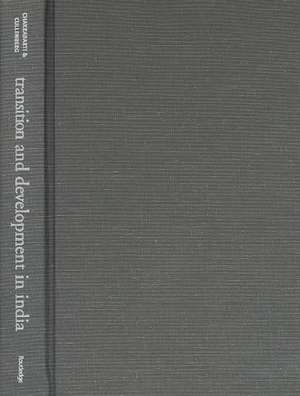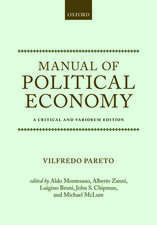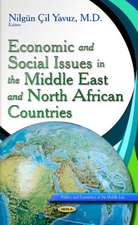Transition and Development in India
Autor Anjan Chakrabarti, Stephen Cullenbergen Limba Engleză Hardback – 30 mai 2003
| Toate formatele și edițiile | Preț | Express |
|---|---|---|
| Paperback (1) | 399.39 lei 43-57 zile | |
| Taylor & Francis – 16 mai 2003 | 399.39 lei 43-57 zile | |
| Hardback (1) | 1069.23 lei 43-57 zile | |
| Taylor & Francis – 30 mai 2003 | 1069.23 lei 43-57 zile |
Preț: 1069.23 lei
Preț vechi: 1303.93 lei
-18% Nou
Puncte Express: 1604
Preț estimativ în valută:
204.59€ • 214.19$ • 169.29£
204.59€ • 214.19$ • 169.29£
Carte tipărită la comandă
Livrare economică 07-21 aprilie
Preluare comenzi: 021 569.72.76
Specificații
ISBN-13: 9780415934855
ISBN-10: 0415934850
Pagini: 386
Dimensiuni: 152 x 229 x 27 mm
Greutate: 0.87 kg
Ediția:1
Editura: Taylor & Francis
Colecția Routledge
Locul publicării:Oxford, United Kingdom
ISBN-10: 0415934850
Pagini: 386
Dimensiuni: 152 x 229 x 27 mm
Greutate: 0.87 kg
Ediția:1
Editura: Taylor & Francis
Colecția Routledge
Locul publicării:Oxford, United Kingdom
Notă biografică
Stephen Cullenburg is Professor of Economics at the University of California, Riverside and a former editor of Rethinking Marxism. Anjan Chakrabarti is Professor of Economics at the University of Calcutta.
Recenzii
"Cullenberg and Chakrabarti's work on India succeeds beautifully in rethinking many of the classical Marxist understandings of class, labor, history, and change, yet within an engaged, committed critique of capitalist political economy." -- Lisa Lowe, co-editor of The Politics of Culture in the Shadow of Capital
"An energetic, imaginative defense of postmodern Marxist theory. More impressively, they have provided a lucid and utterly undogmatic analysis of the moment of economic transition. This book will be useful for all those interested in contemporary changes not only in India but also the rest of the world." -- Amitava Kumar, author of Bombay-London-New York
"The authors do an admirable job of reviewing the relevant literature on the 'transition to capitalism' in India, formulating important points of criticism of that literature, and presenting their alternative notion of transition and applying it to the current debate concerning economic liberalization in India. Their treatment is both thorough and balanced, providing both background material for relative novices and challenging theses for more advanced readers." -- David Ruccio, co-author of Postmodern Moments in Modern Economics
"Transition and Development in India will irritate, and hopefully stimulate, orthodox Marxists and non-Marxists alike. Chakrabarti and Cullenberg dissect the debates in India over modes of production and subaltern studies and offer a reformulated, postmodernist Marxist theory to shed light on the economic reforms introduced in India after 1991. This book is essential reading for those who want to know the direction in which modern Marxism is going." -- Keith Griffin, author of Alternative Strategies for Economic Development
"An energetic, imaginative defense of postmodern Marxist theory. More impressively, they have provided a lucid and utterly undogmatic analysis of the moment of economic transition. This book will be useful for all those interested in contemporary changes not only in India but also the rest of the world." -- Amitava Kumar, author of Bombay-London-New York
"The authors do an admirable job of reviewing the relevant literature on the 'transition to capitalism' in India, formulating important points of criticism of that literature, and presenting their alternative notion of transition and applying it to the current debate concerning economic liberalization in India. Their treatment is both thorough and balanced, providing both background material for relative novices and challenging theses for more advanced readers." -- David Ruccio, co-author of Postmodern Moments in Modern Economics
"Transition and Development in India will irritate, and hopefully stimulate, orthodox Marxists and non-Marxists alike. Chakrabarti and Cullenberg dissect the debates in India over modes of production and subaltern studies and offer a reformulated, postmodernist Marxist theory to shed light on the economic reforms introduced in India after 1991. This book is essential reading for those who want to know the direction in which modern Marxism is going." -- Keith Griffin, author of Alternative Strategies for Economic Development
Cuprins
1. Redrawing the Boundary of Transition and Development in India: A Prelude to an Anti-Essentialist Conceptualization of Transition and Development 2. Confronting the Indian Modes of Production Debate: An Unhappy Encounter of a Third Kind 3. Class and the Question of Transition: Redrawing the Contour of Marxism in India 4. Transition and Development: A Marxian Critique of the Subaltern Studies 5. A Marxian Critique of the Passive Revolution of Capital 6. A Marxian Reformulation of the Concept of Transition: An Anti-Essentialist Approach 7. Class and Need: Towards a Postmodern Development Economics 8. The Political Economy of the New Economic Policy 9. Transition and the Class Structure in the Indian Economy 10. A Conclusion by the Way of Opening Up 'Other' Spaces Appendix of Tables























